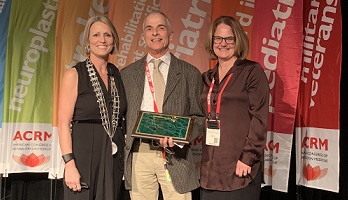
Dr. John Whyte, MD. PhD, FACRM recently received the Gold Key lifetime achievement award from the American Congress of Rehabilitation Medicine (ACRM). The Gold Key, awarded by the ACRM Awards Committe and Board of Governors, is the ACRM's highest honor.
Dr. Whyte is a physiatrist and psychologist, and founding director of the Moss Rehabilitation Research Institute (MRRI) in Elkins Park, Pa which is devoted to improving the lives of individuals with neurological disabilities (stroke, brain injury and other central nervous system disorders) through research. Dr. Whyte now serves as Institute Scientist Emeritus for the MRRI.
Throughout his career, Dr. Whyte's research has focused on assessment and treatment of patients with traumatic brain injury, including those with disorders of consciousness and he has been an active participant in the key research, policy, and ethical developments addressing this patient population. Trained as a medical specialist in Physical Medicine and Rehabilitation, and as an experimental psychologist, his first rehabilitation position, in the fee-for-service era, was in a facility that provided care to approximately 80 patients at a time with a DOC. There he became interested in the great variation in recovery among seemingly similar patients, in the lack of tools to objectively assess their level of consciousness, and in the frequent arguments between staff and family members and even among staff about a given patient’s actual state of consciousness.
Despite the subsequent research obstacles described, he continued to pursue these interests at the MRRI until the present time, and has been involved in all of the following milestones:
- 1992: Development of “Individualized Quantitative Behavioral Assessment (IQBA)”, a reliable method for objectively assessing consciousness
- 1995: Development of the Responsiveness Program, a specialized rehabilitation program for patients with disorders of consciousness that was based on the use of IQBA and continues to operate today.
- 2001: Participant in the Aspen Working Group, which first defined the “Minimally Conscious State” (MCS), in which patients inconsistently demonstrate evidence of consciousness. Publication of the MCS case definition resulted in an explosion of published research on DOC.
- 2004: Co-developer of the “Coma Recovery Scale – Revised,” a standardized scale for assessing consciousness, originally developed by Joseph Giacino, which is now the most widely used tool in the field.1997: Organization of the Consciousness Consortium, a DOC research network that conducted an important natural history study of DOC patients which laid the groundwork for the successful and influential amantadine trial.
- 2004: Co-leader (with Joseph Giacino) of a randomized placebo controlled trial of Amantadine, which demonstrated, for the first time, that a treatment could accelerate the pace of recovery of consciousness. The amantadine trial was published in the New England Journal of Medicine (2012) and has led to large scale adoption of this treatment.
- 2013: Co-editor (with Risa Nakase-Richardson) of a special collection of articles on DOC that demonstrated that 1) patients with DOC are capable of substantial recovery over long periods of time; 2) patients with DOC are medically complex and require high intensity and expert medical care; and 3) models of expert care exist within the United States and in several other countries.
- 2009 - 2014: Demonstration that a small minority of patients with prolonged DOC can have a paradoxical temporary recovery of consciousness in response to the sleeping medication zolpidem (Ambien).
- 2012 - 2019: Author or co-author of a series of articles demonstrating continued recovery of individuals with DOC over periods as long as 5 years, and achievement of personal independence and employability in a meaningful minority.
- 2015: Election to the National Academy of Medicine (formerly the Institute of Medicine), largely as a result of his sustained impact in this field.
Although these developments took many years to achieve, in the last year they have reached a “tipping point”: for the first time, an evidence based clinical guideline, produced by the American Academy of Neurology, the American Congress of Rehabilitation Medicine, and the National Institute on Disability, Independent Living, and Rehabilitation Research’s (NIDILRR’s) Traumatic Brain Injury Model System, has concluded that the combined weight of this research mandates changes in clinical care and healthcare policy for this patient population.
Among other things, this guideline supports access to specialized multidisciplinary rehabilitation for patients with DOC, the use of Amantadine in traumatic DOC, and notes that the pessimism that drives early withdrawal of care is not warranted by the longitudinal data. These system changes, however, have yet to be achieved, and the caregiver’s task of balancing hope and acceptance has never been more challenging.